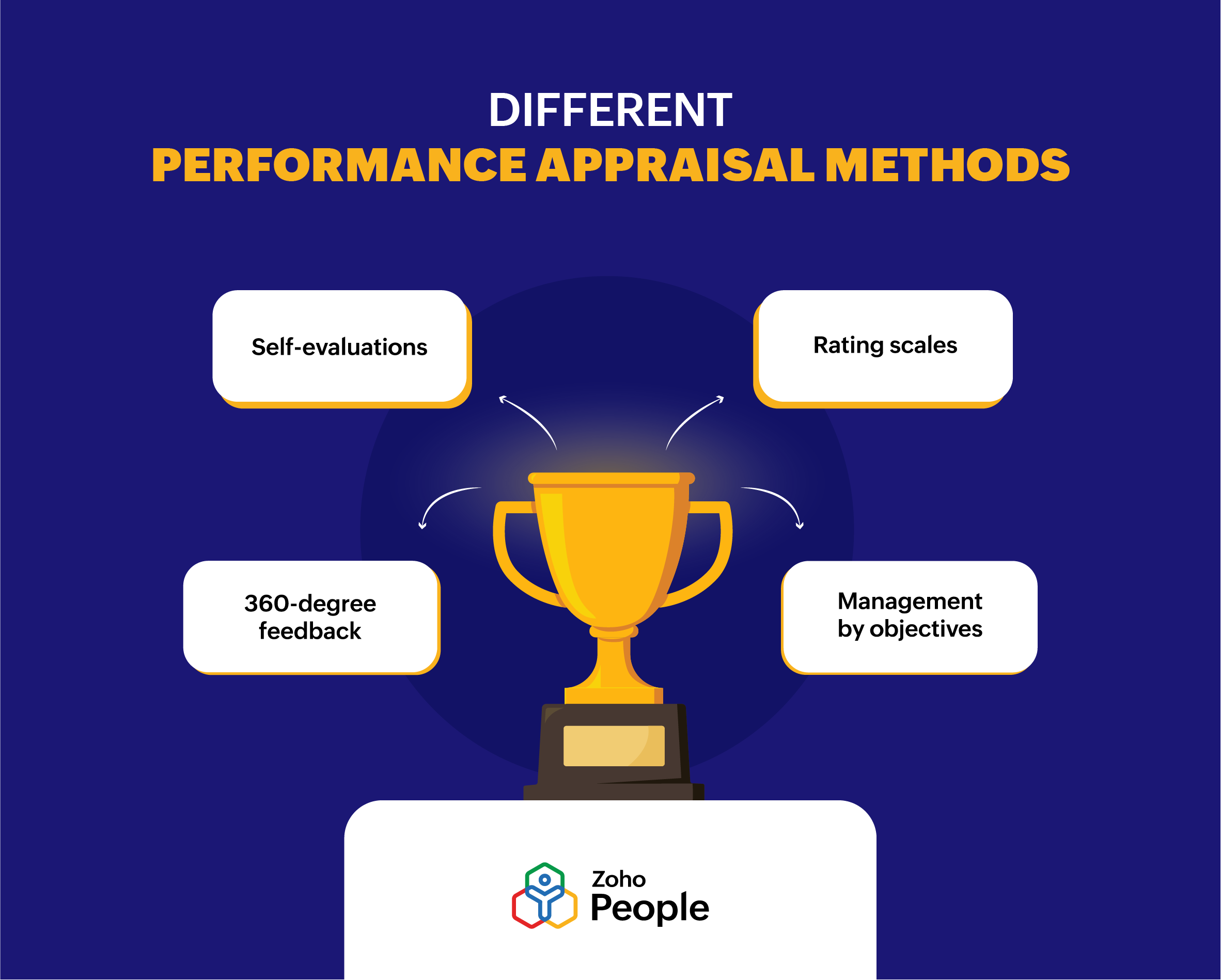- HOME
- Performance and Culture
- What is a performance appraisal? The ultimate guide with different methods, examples, and tips
What is a performance appraisal? The ultimate guide with different methods, examples, and tips
- Last Updated : January 8, 2026
- 1.8K Views
- 8 Min Read

Employees, especially ones in the younger generations, want to be associated with organizations where they can have a real impact. They are extremely purpose-driven and expect to climb up their career ladder consistently. To cater to their needs, it's essential to focus on running meaningful performance appraisals, as they enable employees to determine their strengths and weaknesses and streamline their performance. If you're looking to establish a comprehensive performance appraisal process at your organization, read on to have all your questions about performance appraisals answered.
What is a performance appraisal?
A performance appraisal is an essential HR function that involves evaluating an employee's performance over a set period of time to identify how they've progressed towards their goals, determine their strengths and weaknesses, offer constructive feedback that helps them improve, and provide fair salary hikes and promotions. As part of performance appraisals, managers work along with employees to set clear expectations and goals for the upcoming performance period.
What are the different performance appraisal methods?

The following are some different methods of performance appraisal that HR teams can use to review employee performance:
1. Self-evaluations
Self-evaluations encourage employees to evaluate their own performance. Employees can reflect on how they've strived to achieve their work goals and align with their company's objectives. These insights offer additional information to managers just so that they can review employees more fairly, without any implicit biases.
Typically, there is a standardized self-evaluation questionnaire that helps employees clarify their accomplishments and responsibilities. Here are some questions that you can consider including in your self-evaluation template:
What are some key goals you've accomplished this year? What helped you achieve these goals?
What are three areas where you've performed exceptionally well?
What are three areas in your performance that could use improvement?
What are some of the challenges you faced in your work, and how have you overcome them?
How have your responsibilities and accomplishments grown since your previous performance review?
What do you like the most about your role? What do you like the least?
What are some company values that you reflect in your daily work?
How would you rate your performance on a scale of 0 to 8?
Also read: Everything you need to know about self-evaluations
2. 360-degree feedback
360-degree feedback is another useful appraisal technique that gathers insights from an employee's colleagues. These colleagues evaluate the employee's performance and offer feedback that helps the employee overcome their weaknesses and build on their strengths. Typically, feedback about an employee's performance is collected from their reporting managers, team members, peers from other teams that they've worked with, their subordinates, and in some cases, even the clients they've worked with. Before initiating 360-degree feedback, it's good to set clear expectations for reviewers and help them understand which aspects of performance and which behaviors they're expected to evaluate. Later, managers share this feedback with employees.
Also read: Everything you need to know about 360-degree feedback system
3. Rating scales
In this performance appraisal technique, managers rate each aspect of employee performance, including hard skills, soft skills, quality of work, quantity of work, and goal progress, based on a numerical or qualitative score. Some of the most commonly used rating scales are:
Likert scale
A Likert scale has a series of statements regarding an employee's performance, and managers are asked how much they agree or disagree with each of the statements. Usually, the options offered are strongly agree, agree, neutral, disagree, and strongly disagree.
Numeric performance rating scale
In this numeric performance rating scale, managers rate employees on a scale of one to five based on how they meet their deadlines, achieve their goals, work with their team, innovate and take on new responsibilities, and the enthusiasm they show for professional development. On this scale, five means that the employee goes above and beyond in their work, and one means that the employee's performance is poor.
Behaviorally anchored rating scale
In this rating scale, employee performance is compared against a specific set of behaviors, which are then rated using a numerical scale. For instance, in a customer support role, certain behaviors like clear communication, patience and empathy, and adaptability can bring higher ratings.
4. Management by objectives
In this performance appraisal technique, managers and their employees set clear goals and objectives for the upcoming performance period. Managers keep monitoring employees on how they progress toward their goals and objectives and evaluate them based on the results. Their actual performance is compared against the set objectives. During this process, managers typically define five to ten goals for their team members based on the duration of their performance period. They also offer a brief description for each goal, elaborate on how it connects with their company objectives, explain how employees can achieve them, and set a mutually agreed upon timeline to check progress. For instance, goals for a salesperson may be something like increasing sales by 10% in the next quarter or decreasing the sales cycle from six months to three months.
How to run meaningful performance reviews
Running performance reviews that are relevant and useful to employees is crucial to improving employee productivity, thus enhancing your organization's bottom line. Here are some tips to run meaningful performance reviews for your employees:
Encourage managers to offer constructive feedback and appreciation to their team members regularly during one-on-ones, rather than waiting for the actual performance evaluation period. This will help employees improve and achieve their goals.
Be sure to kickstart the performance appraisal process well ahead of time so that you have enough time to review all the projects that your employees have worked on, track goal progress, and prepare useful performance feedback.
Ensure managers are extremely fair with the entire evaluation process so they don't give in to unconscious biases. Having self-appraisals and 360-degree feedback can offer managers varied perspectives on employee performance.
Let employees ask questions and offer their feedback during the performance appraisal process. Listen to their concerns too, and take steps to rectify any issues.
Encourage managers to set clear expectations for their team members for the upcoming performance period.
Check out more detailed information about running meaningful performance reviews in our HR Knowledge Hive.
What are some examples of performance appraisals?
Here are some positive and negative examples of different traits and attitudes considered in performance appraisals:
Role-related skills
Positive and constructive: "Your proficiency in data analysis is truly commendable. While we were trying to amp up our employee engagement strategies last year, your initiative to collect, clean, analyze, and interpret employee-related data gave us a bunch of useful insights that helped us identify the needs of our employees and craft personalized strategies. Well done! Machine learning is another skill that you can try and master in the upcoming performance period. This will help us better predict employee behavior."
Negative: "While your data analysis skills are strong to some extent, there's room for growth. Your efforts in handling employee data definitely yielded some insights, but they could have been more comprehensive and actionable. To enhance your effectiveness, it would be beneficial to refine your analytical techniques and delve deeper into data interpretation. It's essential to take steps to strengthen your foundational data analysis skills."
Quality of work
Positive: "When it comes to quality of work, your output has exceeded our expectations. While catering to the high-priority ticket that we received from Customer X last month, you made sure to communicate proactively with the customer and collaborate with the development team to get work done on time. Even after the resolution, when the customer had a question, you made it a point to provide detailed information. This is the kind of service that delights our customers."
Negative: "Looking at the customer tickets that you've handled, your work has regrettably fallen short of our quality standards. Two of our customers have complained that your communication lacked clarity. We see that your collaboration with the development team was less than satisfactory, leading to delays. This level of service is disappointing and does not meet our expectations. However, we're sure that we can turn this around and make things better."
Innovation and creativity
Positive: "Your creative and innovative approach towards our marketing visual designs is making a true impact. All the creatives used in the recent lead-focused email campaign were eye-catching, and the CTAs were very well placed. It's clear that you put a lot of time and planning into the project. By deviating from traditional designs and embracing a unique approach, you were really able to capture our audience's attention. This is evident from the increase in the click-through rate."
Negative: "When I look at your recent designs, I see that you've put some effort into them, but there's a lot of room for improvement. Some designs, while original, are very flashy and distracting, so the message that we were trying to convey didn't get across to our audience. It would be ideal if we could take steps to use your innovative mindset while remaining consistent with our brand guidelines and effectively capturing our audience's attention. For instance, we could try interactive elements for the upcoming campaign."
Performance appraisals in Zoho People
With Zoho People, our comprehensive HR software, running performance appraisals can become a breeze for HR teams and managers. Before the appraisal period, managers can track a number of performance evaluation metrics including goals, KRAs, skillsets, and competencies to review employee performance. HR teams can initiate the appraisal process in just a few steps and even conduct self-appraisals and 360-degree feedback as part of the appraisal process. You can even set an appraisal budget for each team and facilitate salary hikes seamlessly. Learn more about the performance management system in Zoho People.
FAQs
1. How often should organizations conduct performance appraisals?
Performance appraisals can be conducted once a month, quarter, or every six months, based on your organizational policies. This will help the organization keep employee performance on track and enable employees to gain a sense of direction.
2. What is the purpose of the performance appraisal process?
The major purpose of performance is to help employees understand their strengths and weaknesses, set goals that will keep their performance aligned with your organizational goals, and determine skill gaps.
3. Who runs a performance review?
Performance reviews are usually run by HR teams along with managers, as they understand their team members' performance, responsibilities, and goals more than anyone else in your organization.
4. What are self-appraisals?
Self-appraisals are a part of performance reviews that are run to understand how employees perceive their performance. During this process, employees often reflect on their performance, goal progress, and key achievements and submit their insights.
5. Are annual performance reviews still effective?
Annual performance reviews are not as effective, since employees usually require feedback and goals evaluation for more than a year. In some cases, managers may even forget some of their employees' achievements or the projects that they've worked on.
 Tarika
TarikaContent Specialist at Zoho People


